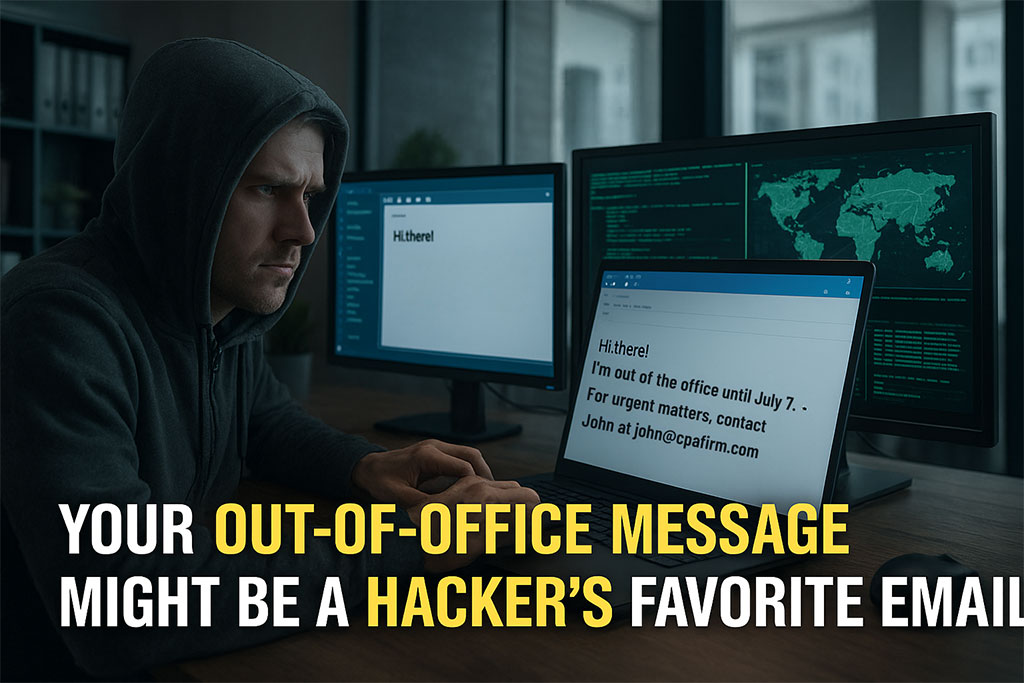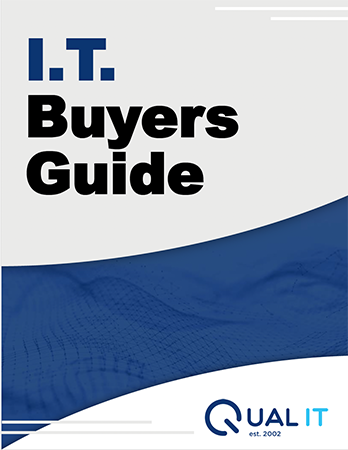 It’s vacation season in Salt Lake City. You’re wrapping up client work, setting your out-of-office reply, and dreaming of Park City getaways or flights to the coast.
It’s vacation season in Salt Lake City. You’re wrapping up client work, setting your out-of-office reply, and dreaming of Park City getaways or flights to the coast.
But while you’re logging off, hackers are logging on—and your auto-reply might be giving them everything they need to launch a cyberattack on your CPA firm.
Here’s why a simple vacation message can turn into a compliance nightmare and what you can do to prevent it.
👀 Why Your Out-of-Office Reply Is a Goldmine for Cybercriminals
Let’s say your message reads something like this:
“Hi there! I’m out of the office until July 7. For urgent matters, contact John at john@cpafirm.com.”
Looks harmless, right?
Wrong.
To a hacker, that message reveals:
- Your full name and title (perfect for spoofing)
- The exact window when you’re unavailable
- An alternate contact to target
- Your internal team structure
- Travel details or absence-related context
That’s everything a cybercriminal needs to impersonate you—or your colleague—and launch a Business Email Compromise (BEC) attack that could drain your firm’s funds or expose sensitive tax data.
🧠 Real Talk: How CPA Firms Get Hacked During PTO
Here’s how it plays out:
- Your OOO auto-reply goes live.
- A hacker spoofs your email address or your colleague’s.
- They send a legit-looking request:
“Hey, can you wire $14,500 for the IRS payment before EOD?”
- Your admin or staff member—under pressure and unaware—acts on it.
- You come back from vacation to find out your firm just got fleeced.
This isn’t theoretical. Salt Lake City firms—especially in finance and accounting—are prime targets because of the sensitive data they manage and the high trust placed in internal email.
🛡️ How to Protect Your Firm from Vacation-Based Email Exploits
CPA firms can't afford to gamble with cybersecurity—especially when staff are OOO. Here’s how to tighten up fast:
✅ 1. Keep Auto-Replies Vague
Ditch the details.
🔒 Better: “I’m currently out of the office and will respond upon my return. For immediate assistance, contact our main office at [central contact info].”
Avoid naming colleagues or listing internal emails unless absolutely necessary.
✅ 2. Train Your Team on CPA-Relevant Email Threats
Especially your admin staff. They’re on the front lines.
- Don’t act on email-only instructions involving money or client data.
- Always verify sensitive requests through a phone call or internal chat.
- Know the signs of spoofed emails—even if they “look right.”
✅ 3. Use Enterprise-Level Email Security
If your MSP isn’t already using these tools, it’s time to ask why:
- Advanced phishing filters
- Anti-spoofing protocols (SPF, DKIM, DMARC)
- Email domain monitoring to detect impersonation attempts
✅ 4. Enforce Multi-Factor Authentication (MFA)
If your email platform doesn’t have MFA turned on, you're inviting risk. MFA stops over 99% of credential-based attacks.
✅ 5. Partner With a CPA-Savvy Managed IT Provider in Salt Lake City
This isn’t just about tech—it’s about understanding the stakes for CPA firms.
Work with an IT partner who:
- Monitors your systems 24/7—even while you’re OOO
- Understands IRS, AICPA, and state-level compliance needs
- Knows how cybercriminals target financial professionals
- Speaks your language—not just tech jargon
🌴 Want to Actually Enjoy Your Vacation This Year?
If you’re a CPA firm owner in Salt Lake and you want peace of mind—not panic—when you step away, we’ve got you.
Schedule your FREE CPA Cybersecurity Assessment today.
We’ll pinpoint vulnerabilities in your email systems, lock down your defenses, and give you a battle-ready plan to keep your inbox—and your firm—safe, no matter where you are.
Because the only thing you should worry about on vacation… is sunscreen.



